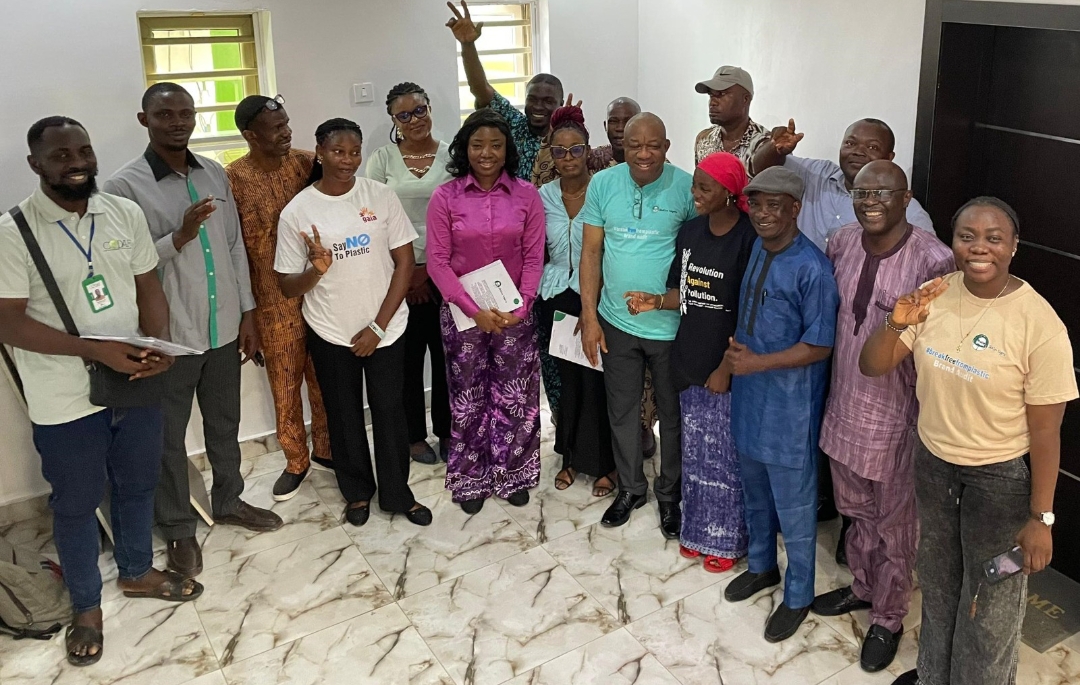
By Edu Abade
In spite of the global threat of plastic pollution, the production of alcoholic and non-alcoholic beverages in non-degradable, small single use plastics (SUPs) and sachets, exacerbated by unemployment, shrinking income levels and general economic hardship among poor citizens, has resulted in “an expanding and booming sachets economy” in Nigeria.
This was the verdict of a report on Plastics Brand Audit 2019-2024 carried out by the Sustainable Research and Action for Environmental Development (SRADev Nigeria) and unveiled at a media briefing in Lagos on Friday, June 13, 2025 on its National Campaign to Eliminate Plastic Pollution in Nigeria under the auspices of the Break Free From Plastics (BFFP) movement and the Global Alliance for Incinerator Alternatives (GAIA).
Speaking, Executive Director of SRADev, Dr. Leslie Adogame, said the event was remarkable because following SRADev’s launching of a national campaign in 2020, the report was unveiled to mark the 2025 World Environment Day (WED) with the theme: Beat Plastic Pollution, pointing out that the World Environment Day has become the biggest international day for the environment.
“Led by the United Nations Environment Programme (UNEP) and held annually since 1973, it has grown to be the largest global platform for environmental outreach. It is celebrated by millions of people across the world. This year’s event observance comes as countries make progress towards securing a global treaty to end plastic pollution, including in the marine environment.
“World Environment Day, held yearly on June 5, is the United Nations’ flagship environmental campaign. It mobilizes individuals, communities, and governments worldwide to reflect on their relationship with the environment and take action on critical issues. This timely theme calls attention to one of the most pressing environmental and public health challenges of our time. Plastics are not just an environmental problem; they are a public health emergency,” he stated.
Adogame, who explained that microplastics and toxic additives in plastic packaging are known to leach into food and water, added that mounting evidence links plastic pollution to serious health risks, including endocrine disruption, reproductive harm, respiratory diseases and even cancer.
He lamented that microplastics have been detected in drinking water, human blood, semen and breast milk, raising urgent concerns about their long-term effects on human health, noting that plastic pollution exacerbates the deadly impacts of the triple planetary crisis: the crisis of climate change, the crisis of nature, land and biodiversity loss, and the crisis of pollution and waste.
“Globally, an estimated 11 million tons of plastic wastes leak into aquatic ecosystems each year, while microplastics accumulate in the soil from sewage and landfills, due to the use of plastics in agricultural products. The annual social and environmental cost of plastic pollution ranges between $300 billion and $600 billion,” he said.
In his presentation of the report’s key findings, Project/Programmes Manager of SRADev, Victor Fabunmi said with over 11,000 plastic items audited in six locations in Lagos State, the group determined the list of “10 Top Polluters” primarily based on the number of the companies’ or brands found to be polluting the environment, while also taking into account the number of plastics collected per brand or manufacturer.
“Together, these metrics capture both the distribution and depth of plastic pollution associated with companies and their brands. To put it simply, these results reveal the companies polluting most places with the most plastics.
“Our analysis of the data reveals Coca-Cola Company, PepsiCo, Rite Foods (Bigi), CWAY Group, Mr. V Water, Viju Industries, La Casera Company, Nirvana Table Water, Adbuk (sachet water) and Seaman’s Schnapps (Intercontinental Distillers Limited) as the top 10 global polluters. These brands cut across soft drinks, sachet water, alcoholic drinks and packaging materials.
“On a five-year average of the waste characterization, PET showed that Polyethylene Terephthalate bottles, sachets)–55 percent, others (bottle labels, multilayer sachets, unknowns)–25 percent, Low-Density Polyethylene (LDPE) packaging films, wraps– 10 percent are most prevalent. PET bottles and multilayer sachet packaging clearly dominate the waste stream, while multilayer flexible packaging (often unbranded) is growing rapidly and poses major end-of-life management challenges,” he stated.
Fabunmi also explained that food packaging (bottles and sachets) accounted for between 89 percent and 99 percent of total plastic pollutants audited in 2023 and 2024 adding that emerging trends showed that sachet water and alcohol plastics are becoming a major menace in communities.
“Sachet water packaging (Adbuk, Safrika, Nirvana) are increasing in volumes and difficult to recycle or capable of existing EPR framework, while alcohol sachets (Seaman’s Schnapps, others), which were previously banned by the National Agency for Food, Drugs Administration and Control (NAFDAC), now and unbanned re-emerging strongly.
“The same multinational and local brands continue to dominate the waste stream. Sachet economy continues to expand water, alcoholic beverages and condiments in Nigeria,” he added.
Adogame, who spoke in company of representatives of the Lagos State Waste Management Authority (LAWMA), Dr. Essien and the Association of Waste Pickers of Lagos (ASWOL), Friday Oku, noted that people all over the world are rejecting single-use plastic and consumer goods companies are feeling the pressure.
“It is so much so that many of them have made commitments that they claim will make their products more sustainable but largely protect the outdated throwaway business model that got us into this mess in the first place. Efforts by some top three polluters underscore how far the consumer goods sector must go.
“Nestlé for example has committed to making all its packaging recyclable or reusable by 2025 but has no clear plans for reducing the total amount of single-use plastic (SUP) it puts into the world and the company sells over a billion products a day in single-use packaging.
“Coca Cola has recently unveiled a single-use plastic bottle using plastic collected from the oceans, and in 2009 they promoted a plastic bottle made from plants. None of these products will stop or reduce Coke’s growing plastic pollution and reinforce the myth that single-use plastic can be sustainable.
“And PepsiCo joined the Alliance to End Plastic Waste that brings together plastic producers, oil companies and other consumer goods companies to promote beach cleanups and improve recycling as a way to ensure future demand for petrochemicals to make more plastic.
“These efforts and others focused on making packaging recyclable or compostable, do not get to the heart of the problem and all but guarantee the plastic pollution crisis will grow worse. In Nigeria today, existing companies’ commitments are simply not enough,” he stressed.
SRADev maintained that the report further reinforces the need for corporations in Lagos and Nigeria at large to accept responsibility for the full life-cycle impacts of their products and the packaging in which their products are sold.
The report launch signifies an eloquent testimony of our commitment to support the Nigerian government. It also reflects our deep desire to provide a healthy environment that ensures the economic and social well-being for the Nigeria populace.
Adogame further stated: “Waste management systems and environments in Lagos and other cities are suffering under continued increase in the production of plastics, and consumer goods companies have an opportunity and an obligation to stop this crisis where it starts.
“Individuals and cities have the power to hold these brands accountable by demanding food, drinks, and personal care products that are either unpackaged or contained in reusable packaging. Responsibility for this plastic pollution problem lies not with individual “litterbugs,” but with corporate polluters who must adopt sustainable solutions and systems to stop the crisis. The time to turn off the plastics tap is now!”
SRADev partners and representatives of the Community Development Advocacy Foundation (CODAF), a member of the GAIA coalition, Venath Onyeka and Jeru Maimoni and others participants who joined the media briefing virtually, including Jeremiah Ato, Benson Dotun Fasanya of the Centre For Earth Works (CFEW) and Deaconess Lucky, urged the recurring big plastic polluters like Coca Cola, PepsiCo, Nestle, Rite Foods, 7Up Bottling Company and CWay, among others to take responsibility for their environmentali infractions, insisting that a greener Lagos and Nigeria is achievable.












bn09zd